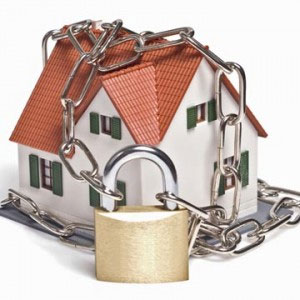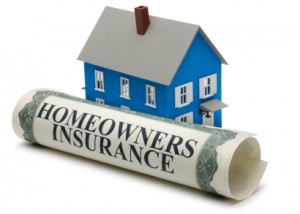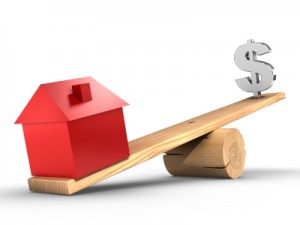
1. Apply some fake security company decal stickers to select windows in high-visibility areas throughout the home
2. Install some dummy security cameras in the front and sides, making sure to keep them at least 10-12 feet off the ground
3. Use energy-saving compact fluorescent lights (CFLs) in all the outdoor sockets and just leave the lights on all the time
4. Make use of indoor timers to control on/off cycles of certain lamps in the bedrooms and living areas
5. Change all your door locks to include a brand that is recognized as “bump-proof”
6. Have an alarm system installed with remote monitoring or activate your service if you already have one in the house
7. Put in carbon monoxide detectors on both floors or each end of the home and smoke detectors in all the bedrooms
8. Keep a fire extinguisher in the pantry or utility closet, not the garage as summer temperatures and car heat can be dangerous
9. Consider metal security doors and gates for courtyards, side entrances and ground-floor windows
10. Have a plan to make an emergency exit in case of smoke or intrusion and know where to meet at some place safe
10 Ways to Make Your House Safer
Homeowners Insurance Tips

Things you need to consider about homeowners insurance:
- Loyalty is overrated – while insurers are competing hard for new clients, many have been increasing rates to make up for the losses they suffered during the recent financial crisis. Some new policyholders are getting better deals than existing customers, so be sure to check for some quotes online when you receive your renewal statement. Also consider moving your automobile insurance too, as bundling both policies with the same insurer can save you 5%-15% on premiums.
- Over insured – most homeowner policies contain an inflation protection that automatically increases your coverage by a few percent each year. Remember that you may have your home insured for its construction (replacement) value or for an amount much higher than it is currently worth in the market. Adjusting it down to reflect the 30-40% price drop in real estate will save you hundreds.
- Check your claim history – just like lenders who check your credit report, insurers check your past in national databases like Comprehensive Loss Underwriting Exchange (CLUE) to see what claims you may have filed. Those records can be full of errors, so check your insurance report for any mistakes at Choice Trust – it’s free if you have been denied coverage and $19.50 otherwise.
- Watch for small claims – Choose the highest deductible (at least $1000) you can afford and bank the savings to cover the cost of minor repairs out of pocket. This alone can save you as much as 25% on your annual premium. Filing a claim for every leaky pipe or broken window will cost you up to 15% more on a renewal. Even simply inquiring about making a claim (without even actually making a claim) can raise a red flag and ding you when renewal time rolls around.
- Home history matters – If you’re buying a house, know that the claim history associated with that property can cause you to pay higher premiums than you would otherwise. Certain locations that are susceptible to flooding may be more prone to claims. To get data on prior claim history, ask for a CLUE disclosure report from the seller.
10 Fun Facts About Phoenix

1. Most expensive house sold for $35 million in 2002, located in North Scottsdale
2. It is not unusual for Phoenix to record more than 100 days in a row of temperatures over 100 degrees
3. Average annual rainfall in Phoenix is only 8 inches
4. Phoenix is renowned for tourism, business conventions, spas and golf
5. Hottest day on record was in June 1990 when thermometers read 122 degrees or 50 celsius
6. Urban sprawl is 475 square miles and is home to 4.3 million residents, 12th largest metro area in the US
7. Some dangerous creatures living here include rattlesnakes, scorpions, coyotes, wild boars and mountain lions
8. Phoenix is represented in all 4 major league sports (NFL, NBA, NHL, MLB) plus NASCAR
9. Only 4 hours driving West to a beach or 4 hours driving North for skiing
10. Popular retirement destination that is replacing Florida as the best place in the US to retire
Buying and Selling

If you are buying a home today:
- You still have the upper hand in making a great deal but you won’t find the huge discounts from listing prices any more, mostly because sellers have dropped their prices already and there is a good deal of buyer competition for flipping properties or purchasing investment rentals. Making an offer 10% below list is still reasonable, but don’t expect a sure deal. The average homebuyer today is only saving about 3% from the listing price. So look for the seller to perhaps pay your closing costs instead, which can easily save you about $5000.
- List your own home before you start shopping for a new one because it takes about 90 days to sell property today. Sellers will not be happy accepting purchase offers with “sale of my own home” contingencies in them, so you will have more leverage during negotiations since the deal is less likely to fall apart. Getting pre-qualified for a new mortgage is a must-have as well, in order for your purchase offer to be seriously considered.
- Don’t fall in love! Be prepared to walk away if the seller will not make reasonable concessions, as your ability to abandon these negotiations is your best bargaining tool. Given the plentiful supply of very similar and comparable homes on the market, you should not have too much difficulty swapping one house for another in your search.
If you are selling your home today:
- Don’t be offended by lowball offers and be sure to keep your cool so you don’t blow any chance at negotiating. The buyer is most likely just testing you to see how large a discount they can get from the asking price. Thank the potential buyer for their interest and ask that they come back with earnest offers (money accompanying the purchase offer). Show the bidder comparable homes and recent sales data to support your listing price.
- Be honest about the property by having your house inspected before putting it up for sale. In Arizona, you need to make a Sellers Property Disclosure Statement (SPDS) so make any necessary repairs yourself to limit the amount of issues potential buyers will point out to negotiate on.
- Be ready to move fast and make sure you tell potential buyers, especially those with children of school age. It will help your home stand out from the short sales and foreclosures in your neighborhood, which may hove lower list prices but much longer closing periods (up to 6 months). Buyers with a time limit will be more willing to pay up for a house that they can move in to quickly.
10 Ways to Increase Your Home Value

1. Paint rooms a neutral shade and add a few accent walls throughout house in a different color to stand out
2. Add some fabric window treatments (they do not have to be custom made) to soften walls and add more color
3. Rent a carpet steam cleaner and deep shampoo your high traffic areas and brighten up your old rugs
4. Trim your trees and shape up your garden, perhaps by adding some new plants for variety and color
5. Clean out the garage to get rid of junk and clutter, plus you may even make a few bucks selling unused items on Craigslist or eBay
6. Reconsider your current furniture layout, as sometimes moving pieces around the house can maximize their look
7. Make those small home repairs you have been putting off, like fixing the gutters or oiling squeaky hinges
8. Consider adding some stone or tile as a wall accent or backsplash in your kitchen or bathroom
9. Resurface and stain your old outdated kitchen cabinets, then add some nice new hardware to set them off
10. Add some do-it-yourself landscape lighting to your garden to shine up on the trees and house and down on the pathways
